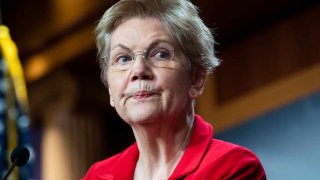
- In an interview with CNBC's "Squawk Box," the Massachusetts progressive senator specifically blasted FedEx, Nike and Amazon while describing why corporations should get with hit with a higher tax rate.
- "What's happening right now in America is these small businesses they pay their taxes at the full rate. They got to pay the whole thing," Warren said.
Sen. Elizabeth Warren took aim at FedEx, Nike and Amazon on Tuesday as she championed the need to raise taxes on corporations and the wealthiest Americans.
In an interview with CNBC's "Squawk Box," the Massachusetts progressive senator specifically blasted the three corporate giants while describing why corporations should get with hit with a higher tax rate.
Get San Diego local news, weather forecasts, sports and lifestyle stories to your inbox. Sign up for NBC San Diego newsletters.
"What's happening right now in America is these small businesses ... pay their taxes at the full rate. They got to pay the whole thing," Warren said. "You look at businesses like FedEx and Nike, businesses like Amazon, and they pay zero. Right now there's a thumb on the scale in the tax part of this, and that is a thumb to help the giants."
Big corporations' lower tax bills actually hurt small businesses by knocking them out of the competition, Warren argued.
Warren's latest criticism of corporate giants comes as President Joe Biden and Democrats are looking to raise the corporate tax rate to 28% from 21% to help pay for a $2 trillion infrastructure package.
Warren, a member of the Senate finance and banking committees, has been calling on the wealthy and corporations to pay what she believes is their fair share of taxes.
Money Report
One of Warren's latest battles has been with billionaire Leon Cooperman, whom she asked to attend a Senate Finance Committee hearing meant to focus on her proposed millionaires' tax. He declined to attend the Tuesday hearing.
Warren again took aim at Cooperman, who often appears on CNBC, in prepared remarks for her Tuesday hearing.
"I'm disappointed that Mr. Cooperman decided he was more comfortable taking softball questions on cable news than subjecting his views to debate in the U.S. Senate" the prepared remarks said. "Mr. Cooperman may have been too frightened to come here today, but others were not."
FedEx and Nike were mentioned in an April report by the Institute on Taxation and Economic Policy as companies that recently paid little-to-no federal corporate income taxes.
"The delivery giant FedEx zeroed out its federal income tax on $1.2 billion of U.S. pretax income in 2020 and received a rebate of $230 million," the report said. "The shoe manufacturer Nike didn't pay a dime of federal income tax on almost $2.9 billion of U.S. pretax income last year, instead enjoying a $109 million tax rebate."
The progressive group Tax March has been targeting the two corporations in TV and newspaper ads. FedEx CEO Fred Smith said in a letter to company members that they "pay all U.S. federal, state, and local taxes FedEx owes, which have totaled nearly $9 billion over the last five fiscal years." Smith also discouraged the raising of the corporate tax rate as a way to pay for infrastructure.
As for Amazon, the Institute on Taxation and Economic Policy estimated the e-commerce giant's federal tax rate was just 9.4% in 2020. That's well be low the "statutory" rate of 21%.
The report also noted that "over the first three years of the Trump-GOP tax law, which dropped the statutory corporate tax rate to 21 percent, Amazon paid an effective federal income tax rate of just 4.3 percent on U.S. income."
Amazon has pushed back on criticism by blaming Congress for the state of the tax code. CEO Jeff Bezos, meanwhile, has said he supports an increase in the corporate tax rate.
Warren pinned the blame for the current tax code on corporate lobbyists such as those working for Amazon.
"How do you think the tax code ended up like it did? It ended up like it did because companies like Amazon sent armies of lawyers and lobbyists to craft every possible loophole that they would be able to use to pay nothing in taxes," Warren said Tuesday.
Amazon invested a record amount of more than $18 million into lobbying in 2020, according to data from the nonpartisan Center for Responsive Politics. One of the company's recent lobbying recent hires was Jeff Ricchetti, the brother of White House counselor Steve Ricchetti.
The Amazon lobbying effort focused on several issues, including tax policy.






